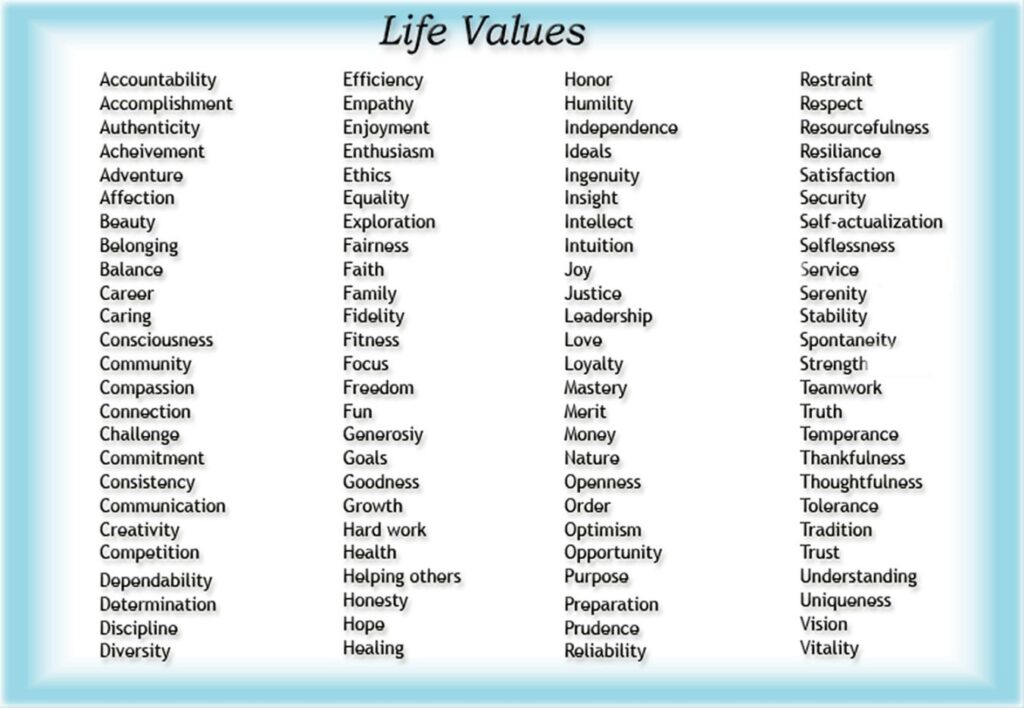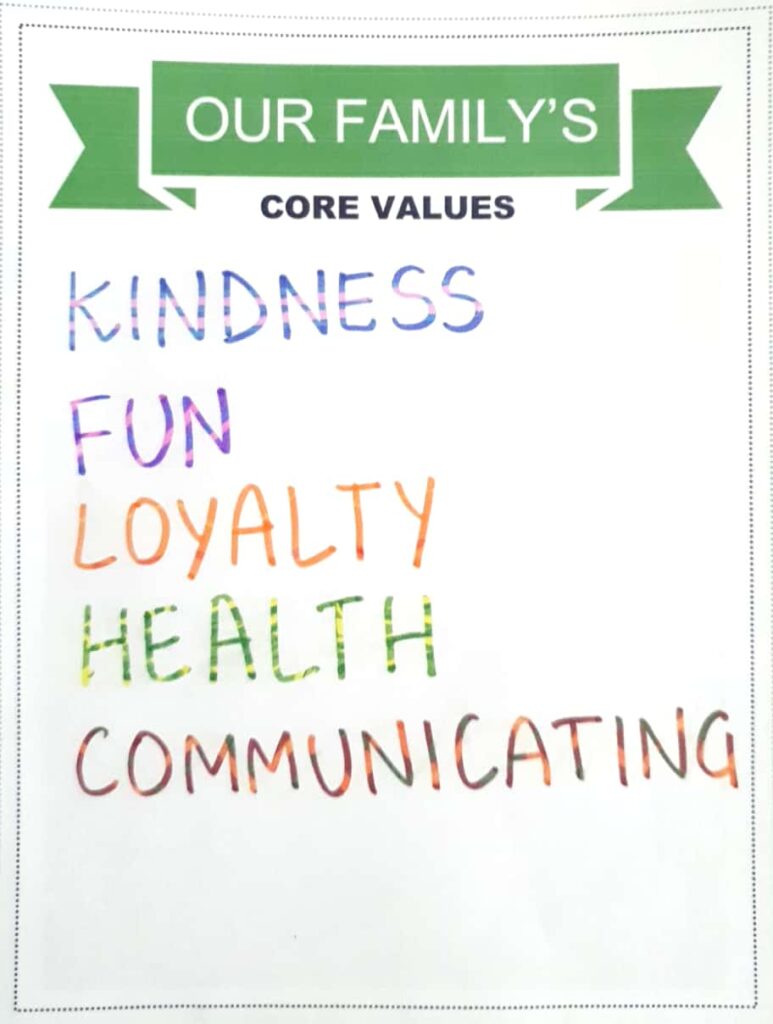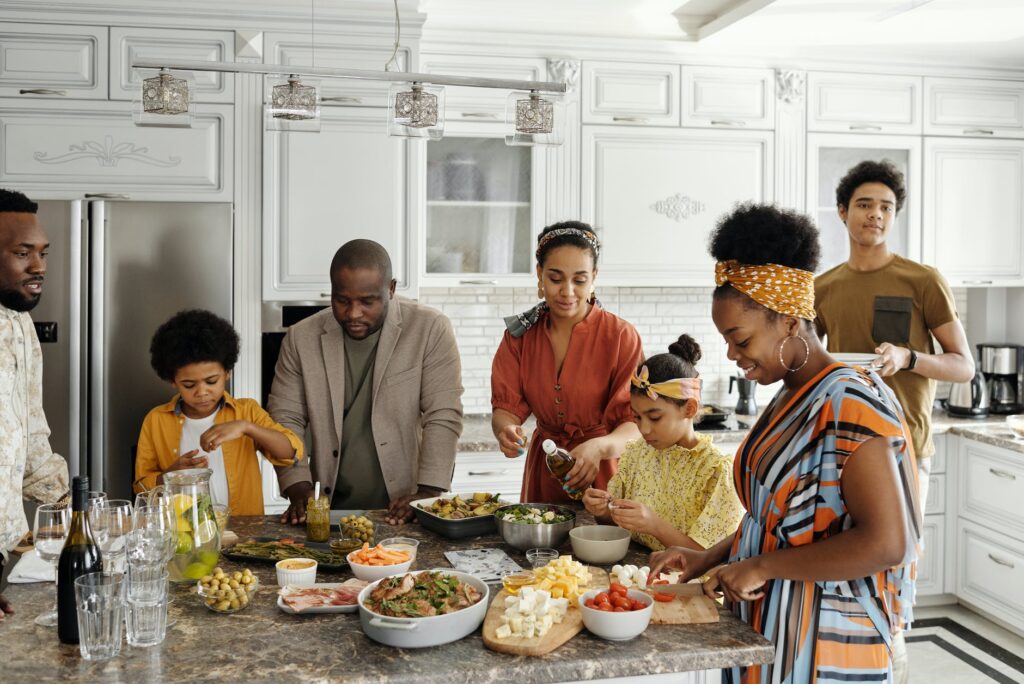Values are our guiding principles. They drive our thoughts, feelings, and actions and give us a sense of belonging and identity. Here values are not restricted to moral and ethical ones. They are our current beliefs or perspective on any area or topic.
Have you ever thought about what guides our decisions? How do we prioritize one task over another? Some may say your gut instinct, moral compass, or experience. But what directs them? Values.
What are Values?
A value is any perspective you hold dear currently in your life. It can be towards a person, place, idea, thought, action, feeling, area of life, or thing.
Let me explain.
I value spending time with my children and having a routine. I value my future relationship with them once they are adults. I give great value to really listening to them and responding positively to their ideas. I value that they become kind adults. I value that they are safe at all times.
Since these are my current values, these will drive my current decisions on my work hours, how I engage with them, what routine I build for them, how I guide them, etc.
As my kids grow older, my values towards them will change and so will my priorities and decisions.
So the first step to making right decisions is to define a clear set of values.
How Do I Identify My Values?
The easiest way is to go through a list and tick those which are important to you.

You can refer to any list freely available on Google. Once you have gone through the list and selected then narrow it to the top 10 values. Write down these values and think about why are they so important.
Where did they come from and how were they shaped? Is it time to reassess some values based on more information and experience, or simply a change in life phase.
Once you have reflected on your top 10 values – bring them down to five. The five core values you stand by and want to inculcate in your life. These will drive all your further decisions and actions. Why you are doing something or not doing something.
Now instead of making default decisions you can make conscious choices based on your chosen values.
A value has value to the extent you value it
Prachi Bansal
Where Do Values Come From?
Your parents are your first heroes and your first value bank. Their words, deeds, and actions are your roadmap to the world outside. So their values become the guiding principles of your childhood.
Unintentionally, you value what your parents value. For example, if you see your dad working long hours and missing family events your value becomes work is important than family. Or if your mother is dominated by your dad, your value becomes that women should keep quiet when men are talking.
Even if you do not like it at that time in your life, when you yourself turn into an adult you start acting unconsciously as your parents did. Because they are the only reference you have.
Then comes values of your friends, teachers and school. What messages does your school ingrain in you through assembly talks, competitions and environment. How do your teachers praise or criticise you ? What kind of friends do you have? Studious, belligerous, adventurous or disruptive.
After that, come your experiences with your relatives, neighbors, and society as a whole. Do most people follow traditions or our willing to change with times? Is speaking up for yourself considered an act of courage or bad behavior?
All these countless daily interactions, observations, and experiences make up our value system. It is like a map that we then use to navigate the world.
Do values change over time ? And should they ?
In our childhood, as described above we all develop a value map to navigate the world. This map is first used fully during the teen and young adult years as we move into the outside world and have more autonomy over our decisions and life.
For example, accepting or declining a late-night party invitation, lying to parents about grades or whereabouts, or being seduced or not into alcohol, smoking, drugs, and sex.
Now as we turn into adults – our exposure to different values increases, we have more information about certain values and may be different perspectives on our old ones. Also since our prefrontal cortex (thinking brain) develops by this time, we literally have more brainpower to assess and respond ably to situations. Thus our life phase changes.
For example as a child I thought touching alcohol was a sin. This was a value ingrained by my dad since the way he talked about people who consumed alcohol. As I began my twenties and got more information on both these topics I realized alcohol in huge unchecked quantities can lead you down the rabbit hole but in small balanced quantities, it can be tasteful and pleasurable. So I became a social drinker. Thus my value about alcohol changed with more information, exposure and maturity.
Similarly, when I became a mother my parenting style when my kids were infants was exactly like my mother. Even though we have different personalities and I literally didn’t agree with what I doing. But I did this by default. Because those were my values, my only point of reference. But as I reflected and became more conscious of my words and tone – my parenting, perspective, and I changed!
So every day, week, month, quarter, or year – remove a time and space to reflect on your current values. Is my thinking on this subject relevant or outdated? Do I need more information to confirm or modify this view? Am I growing with this kind of behavior and thought process? Bring down the illusions and see things as they are.
Find and identify your current values because they will in turn become your guiding map to making worthwhile, long-lasting, and happy decisions.
Happiness & Values
So why happy decisions? What’s happiness got to with values? Everything.
Think of a time when you were really happy with a decision you made. It could be starting a course, any diet or exercise, or even ending a toxic relationship. What made you happy or relieved or charged up about this decision? The fact that it aligned with your values.
Now think back to any of your successes or achievements. How were you able to stay motivated and do the work required? What was the driving force to saying no to any distractions and yes to commitment? Your values.
Recently, I made the decision to consciously reduce white sugar in my diet due to health reasons despite the fact that I love desserts. Now, this decision made me happy because my current value of staying fit and healthy took priority over an earlier value of trying every new dessert under the sun. The success of this decision will depend on my determination ( and I will need truckloads) when those wonderful desserts are actually in front of me.
So for any person, group or organization it is imperative to first determine their values. What they stand for and truly believe in. Once these are identified it is easier to sort out priorities, decide on a correct course of action, and develop resilience to hardship. It is proved that those people who have clear values and beliefs are far more resilient, successful, and happier.
To know more on how values play an integral part in resilience, please read the article: Resilience & COVID – 19
Kids & Values
Now we spoke about how kids naturally imbibe what their parents value. So wouldn’t it be wonderful to use this influence positively and consciously and ingrain in them those values which will create happiness and peace in their life?
For this the first step is to raise ourselves. To be conscious about how we speak, act and react since kids are excellent imitators and poor listeners. Role modelling the values we value.
Take a similar list to the one posted at the start of the article and create your family values. Again select them together and narrow it down to five. Give your children a turn to speak of values dear to them. You will be surprised to know how much they have learned from you already. Also, respect the differences.
Then together as a family, you can create a family mantra that exhibits your most important value. For our family it is kindness. So our family mantra is – ‘Kindness is the most important thing in the world’. Similarly, you can create any daily or weekly activities which reinforce your family’s 5 most important values.
Below given are our family’s 5 values:

These values act as clear guidelines for us to decide on activities, rules, and daily interactions. Like kindness guides the way we speak to each other and so does fun! I love talking to my kids in silly voices or doing activities just for the sake of fun! And believe me that creates deep connections between us.
Health encompasses cooking interesting meals and taking care of your body plus a different kind of grit and dedication. Loyalty requires to build trust which comes with always showing up for those who you care about and communication is the key to happy relationships. Another way to positively communicate is problem solving.
To know more on this, please read: Problem Solving Skills & Steps
So start today on a values map for yourself, your family, or your organization – it is the key to a more happier and fulfilling future for you!

